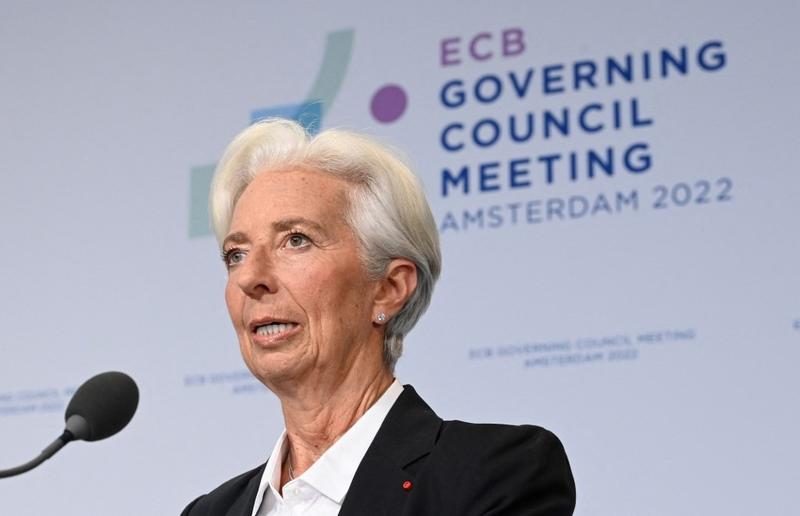 President of the European Central Bank (ECB) Christine Lagarde speaks during a press conference on Governing Council meeting focused on monetary policy in the euro zone in Amsterdam on June 09, 2022. (JOHN THYS / AFP)
President of the European Central Bank (ECB) Christine Lagarde speaks during a press conference on Governing Council meeting focused on monetary policy in the euro zone in Amsterdam on June 09, 2022. (JOHN THYS / AFP)
FRANKFURT - The European Central Bank ended a long-running stimulus scheme on Thursday and signaled a series of rate hikes that may be scaled up from September if the inflation outlook fails to improve.
With inflation at a record-high 8.1 percent and still rising, the ECB now fears that price growth is broadening out and could morph into a hard-to-break wage-price spiral, ending a decade of anaemic price growth and heralding a new era of higher prices.
With inflation at a record-high 8.1 percent and still rising, the European Central Bank now fears that price growth is broadening out and could morph into a hard-to-break wage-price spiral, ending a decade of anaemic price growth and heralding a new era of higher prices
The ECB said it will end bond buys on July 1 then raise interest rates by 25 basis points later that month. It will hike again in September and may opt for a bigger move then if inflation continues to surprise.
"The Governing Council intends to raise the key ECB interest rates by 25 basis points at its July monetary policy meeting," the ECB said.
"The Governing Council expects to raise the key ECB interest rates again in September," it said. "If the medium-term inflation outlook persists or deteriorates, a larger increment will be appropriate at the September meeting."
The rapid rise in inflation was driven initially by energy prices but food and services costs are now also rising.
ALSO READ: Eurozone inflation hits new record at 8.1% in May
The size of rate hikes to curb price growth has been intensely debated by ECB policymakers, with Chief Economist Philip Lane preferring 25-basis-point moves in July and September but others arguing for 50 bps to be considered.
Supporting their case, the ECB raised its inflation projections once again, now expecting inflation at 6.8 percent this year versus a previous forecast for 5.1 percent. In 2023, it sees inflation at 3.5 percent and in 2024 at 2.1 percent, indicating four straight years of inflation overshoots.
"The Governing Council anticipates that a gradual but sustained path of further increases in interest rates will be appropriate," it said.
"High inflation is a major challenge for all of us. The Governing Council will make sure that inflation returns to its 2 percent target over the medium term," the ECB said.
 The European Central Bank (ECB) headquarters stands on the bank of the River Main near skyscrapers on the financial district skyline in this aerial photographer at sunset in Frankfurt, Germany. (ALEX KRAUS/BLOOMBERG)
The European Central Bank (ECB) headquarters stands on the bank of the River Main near skyscrapers on the financial district skyline in this aerial photographer at sunset in Frankfurt, Germany. (ALEX KRAUS/BLOOMBERG)
Markets moved to price in 143 basis points of rate hikes by the end of this year following the statement, up from 138 bp earlier, or an increase at every meeting from July, with some of the moves in excess of 25 basis points.
They are also anticipating a combined 230 basis points of moves in the deposit rate by the end of 2023, putting the interest rate peak close to 2 percent.
That leaves ECB President Christine Lagarde, who just months ago said that a rate hike this year was highly unlikely, in a tricky position at her Thursday news conference.
ALSO READ: Eurozone's inflation rate rises to record high
If she pushes back strongly, the ECB president might signal a commitment that could become obsolete within weeks, much like the no rate increase pledge. But if she ignores markets, even more aggressive tightening might be priced in, pushing up borrowing costs unnecessarily.
The ECB's first rate hike in over a decade will still leave it trailing most of its global peers, including the US Federal Reserve and the Bank of England, which have been raising aggressively and promising even more action.
Unlike the Fed, the ECB also has no plans to reduce its balance sheet with policymakers reaffirming their commitment to keep reinvesting cash maturing from the 5 trillion euros worth of public and private debt the ECB holds.
Where does it end?
While the start of policy tightening is now set, the end point remains uncertain.
Lagarde has said that rates should move towards the neutral point at which the ECB is neither simulating nor holding back growth. But this level is undefined and unobservable, leaving investors guessing just how far the ECB wants to go.
Another question is how the ECB will handle the divergence in borrowing costs of various member states, an issue the ECB said it may address but did not mention in Thursday's policy statement.
Nations with bigger debt piles, such as Italy, Spain and Greece, have already seen yields on their government bonds rise more sharply than less-indebted Germany or France - a headache for the ECB's one-size-fits-all monetary policy.
READ MORE: ECB launches fresh stimulus to boost virus-hit economy


